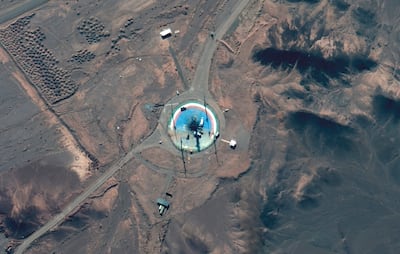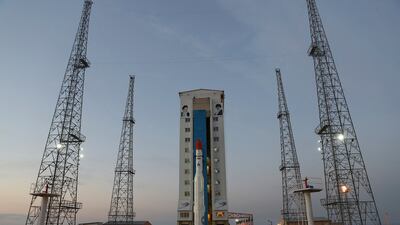Iran’s Revolutionary Guard says it has successfully launched a second satellite into orbit, state media reported on Tuesday.
Western officials and experts said the country’s space programme and such launches by the paramilitary IRGC are covers for ballistic missile tests.
The launch took place in the Shahroud Desert in the country’s north-east — where the main pad of the country’s space agency is located ― state television reported, without saying when it took place.
The IRGC said the Noor-2 satellite reached low orbit on the Ghased satellite carrier, IRNA reported. It described the Ghased as a three-phase, mixed fuel satellite carrier.
The launch comes days after satellite pictures suggested Iran’s civilian programme suffered another failed launch.

Noor means “light” in Farsi. The IRGC launched its first Noor satellite in 2020, revealing to the world that it ran its own space programme.
The head of the US Space Command later dismissed the 2020 satellite as “a tumbling webcam in space” that wouldn’t provide Iran vital intelligence — though it showed Tehran’s ability to successfully get into orbit after a series of setbacks.
Several Iranian satellite launches have ended in failure with rockets blowing up on the launch pad or shortly after take-off.
The US has yet to comment on the launch. However, it comes as Iran’s top diplomats left Vienna, where months of talks on reviving the 2015 nuclear deal with world powers are being held, and suddenly flew back to Tehran for consultations. The EU and US have said that the negotiations are nearing an end and final agreements need to be made if a deal is to be reached.
The West’s Middle East allies, led by Israel, have expressed concern about the revival of the deal that could involve sanctions being removed from Iran. The country’s nuclear developments, ballistic missile programme as well as support for proxies across the Middle East are of major concern.
The US has alleged Iran’s satellite launches defy a UN Security Council resolution and has called on Tehran to undertake no activity related to ballistic missiles capable of delivering nuclear weapons.
Iran, which has long said it does not seek nuclear weapons, previously maintained that its satellite launches and rocket tests do not have a military component. US intelligence agencies and the International Atomic Energy Agency say Iran abandoned an organised military nuclear programme in 2003.












